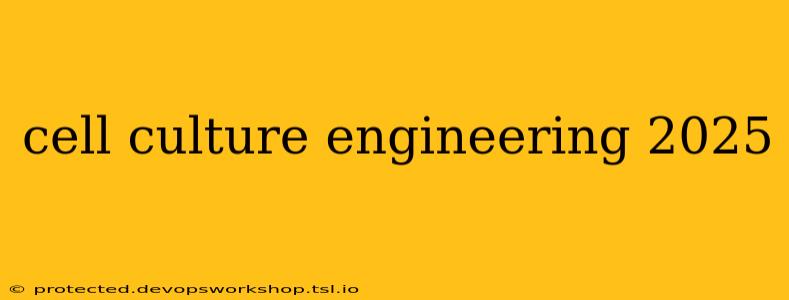The field of cell culture engineering is rapidly evolving, promising revolutionary advancements in biomanufacturing, regenerative medicine, and drug discovery by 2025. This post explores the key trends and technologies shaping the future of this dynamic sector.
The Expanding Landscape of Cell Culture Engineering
By 2025, we can expect to see a significant shift in how cell cultures are engineered and utilized. This isn't just about incremental improvements; we're talking about paradigm shifts driven by converging technologies.
1. Artificial Intelligence (AI) and Machine Learning (ML) Integration
AI and ML are poised to revolutionize cell culture processes. Imagine:
- Predictive Modeling: AI algorithms analyzing vast datasets of cell culture parameters (temperature, nutrient levels, pH, etc.) to predict optimal growth conditions and anticipate potential problems before they arise. This drastically improves efficiency and reduces costly failures.
- Automated Process Optimization: ML can autonomously adjust culture parameters in real-time, ensuring optimal cell growth and product yield. This level of automation reduces human error and increases consistency.
- Drug Discovery Acceleration: AI can analyze complex cellular responses to identify novel drug targets and predict drug efficacy with unprecedented accuracy, accelerating the drug discovery pipeline.
2. Advanced Bioreactor Technologies
Bioreactor design will undergo a significant transformation. Expect to see:
- Miniaturized and Modular Systems: Smaller, more efficient bioreactors, enabling high-throughput screening and personalized medicine applications. Modular designs allow for flexible scalability and customization.
- Microfluidic Devices: These offer unparalleled control over the cellular microenvironment, facilitating precise manipulation of cell behavior and improving product quality.
- 3D Bioprinting and Tissue Engineering: This technology allows for the creation of complex 3D tissue structures for drug testing and regenerative medicine applications. By 2025, expect more sophisticated bioprinting techniques capable of creating highly functional tissues.
3. Closed and Automated Systems
The focus on reducing contamination and improving consistency will drive the adoption of closed and automated systems. This includes:
- Single-Use Bioreactors: Disposable bioreactors minimize the risk of cross-contamination and reduce cleaning validation requirements.
- Automated Cell Handling Systems: Robots and automated systems will streamline various aspects of cell culture, from cell seeding and media exchange to harvesting and downstream processing.
- Enhanced Monitoring and Control: Real-time monitoring of critical parameters, combined with automated control systems, ensures consistent and high-quality cell cultures.
4. Stem Cell Technologies and Regenerative Medicine
Stem cell research and regenerative medicine will significantly benefit from advancements in cell culture engineering:
- Improved Stem Cell Expansion and Differentiation: More efficient protocols for expanding and differentiating stem cells into specific cell types will accelerate the development of cell-based therapies.
- Personalized Cell Therapies: Cell cultures derived from a patient's own cells (autologous cells) will be used to develop highly personalized treatments with minimal risk of rejection.
- Organ-on-a-Chip Technologies: These miniature organs-on-chips mimic the structure and function of human organs, providing a more accurate model for drug testing and disease modeling.
Challenges and Opportunities
Despite the exciting prospects, challenges remain:
- Cost of Technology: Implementing advanced technologies, such as AI and sophisticated bioreactors, requires significant investment.
- Regulatory Hurdles: Gaining regulatory approval for new cell culture technologies and cell-based therapies can be a lengthy and complex process.
- Scalability and Manufacturing: Scaling up cell culture processes from the lab to industrial-scale manufacturing presents significant engineering challenges.
Despite these challenges, the future of cell culture engineering is exceptionally bright. By 2025, the innovations discussed above will unlock unprecedented opportunities in biomanufacturing, personalized medicine, and regenerative therapies, ultimately improving human health and well-being. The convergence of these technologies promises a future where cell cultures are not just a tool for research, but a powerful engine driving innovation across multiple industries.

